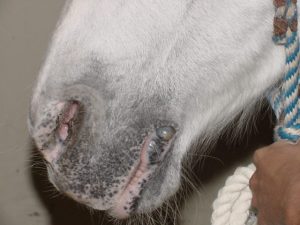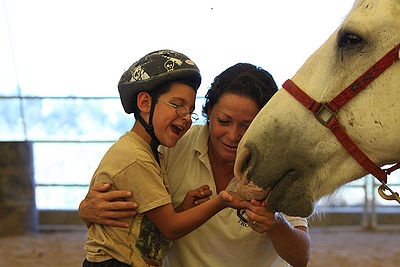 People have given descriptive names to many skin conditions a horse may have such as “girth itch.” But determining the disease requires a professional evaluation.
People have given descriptive names to many skin conditions a horse may have such as “girth itch.” But determining the disease requires a professional evaluation.
Horses have sensitive skin and in order to find the cause of any skin condition, a veterinary examination is required. Early and proper treatment can ease a horse’s distress and have a faster, positive outcome.
Allergies cause skin inflammation, itching, hives, open sores and can be painful. A veterinary dermatologist can test the skin to determine the allergen and then it can be treated appropriately. Often the cause can easily be removed and that solves the problem.
Vasculitis is another immune-mediated disease and appears as inflamed blood vessels within the skin that cause irritation. It often shows up in the pasterns , sometimes lips or eyes beginning with redness and swelling followed by lesions. Call your vet for treatment.
Parasites such as mites and lice may or may not be visible to the naked eye. Horses with lice usually have a weakened immune system. Your vet will take a skin scraping and prescribe a topical medication. If your horse’s condition is poor, ask your vet how you can improve it.
Dermatophilosis commonly known as rain rot is a bacterial infection. Horses that are continually exposed to wet areas can have hair loss, matted hair, oozing, crusting. Treatment is with antiseptics and if necessary, antibiotics.
Pyoderma (folliculitis) is another bacterial infection. It is caused by excessive sweating, upsetting the pH balance. Signs can be hair loss, crustig, scaling. It is treated with local antiseptics and sometimes antibiotics. You can help avoid pyoderma by rinsing off your horse after exercise.
Ringworm (dermatophytosis) is a fungal infection. It is highly contagious to other horses and since it it a zoonotic disease, it can spread to humans. An affected horse is treated with antifungal medications. The horse’s equipment should not be shared with any other horse. All equipment including the stall and its walls need to be disinfected. Horses can still be carriers even after the symptoms have disappeared.
Pythiosis , although not really a fungus, receives the same treatment. It is generally seen in warm and tropical climates. It appears as an ulcerated swelling and can occur deep in the skin. Treatment is immunotherapy and surgical removal. Handle with care as open sores can sometimes transfer the condition to humans. Keep open sores clean and make sure water is always fresh and available.
Papillomatosis is a viral infection that looks similar to warts and can show up on a horse’s muzzle or other soft skin areas. The bumps are harmless and usually disappear on their own within a few months.
Skin tumors are known as Sacroids. They are linked to the papilloma virus and are seen where there is little hair and thin skin and where horses sweat. Diagnosis is made through biopsy. They are usually not life-threatening, but if complications occur, prognosis is poor. Treatment options are surgery, local chemotherapy, local radiation and can be successful.
Melanomas usually affect grey horses and are found under or around the tail or behind the head. They rarely metastasize, but if they impair body functions, can be life-threatening. Early diagnosis of melanomas helps any treatment be more successful.
Squamous Cell Carcinomas are tumors of the skin and mucous membranes. They appear as small bumps or sores, usually on inner eyelids and penis. Surgery may be required to remove affected tissue. Untreated, the horse may have to be euthanized as tumors grow and affect nerves and blood vessels.
Research into earlier diagnosis and better treatment of equine skin disorders continues. At the University of Glasgow, Scotland, a papillomavirus vaccine is being developed that possibly could prevent sarcoids and squamous cell carcinomas.
High quality feeds, regular grooming, properly fitted saddles and pads, hosing down the horse after exercise, all will help keep your horse in good health. And of course checking your horse for any problems and if you find anything unusual, called the vet is a good plan of action.



